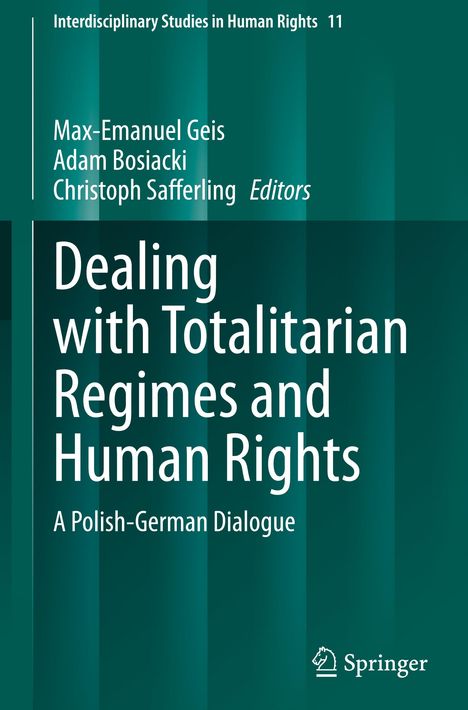Dealing with Totalitarian Regimes and Human Rights, Gebunden
Dealing with Totalitarian Regimes and Human Rights
- A Polish-German Dialogue
(soweit verfügbar beim Lieferanten)
- Herausgeber:
- Max-Emanuel Geis, Christoph Safferling, Adam Bosiacki
- Verlag:
- Springer International Publishing, 06/2024
- Einband:
- Gebunden, HC runder Rücken kaschiert
- Sprache:
- Englisch
- ISBN-13:
- 9783031573378
- Artikelnummer:
- 11907545
- Umfang:
- 272 Seiten
- Nummer der Auflage:
- 2024
- Ausgabe:
- 2024
- Gewicht:
- 576 g
- Maße:
- 241 x 160 mm
- Stärke:
- 21 mm
- Erscheinungstermin:
- 30.6.2024
- Hinweis
-
Achtung: Artikel ist nicht in deutscher Sprache!
Klappentext
This book delves into the intertwined narratives of Poland and Germany's post-war experiences, shedding light on their shared trauma from World War II and subsequent confrontations with communism. Authored by scholars from Faculty of Law and Administration, University of Warsaw and Law School of Friedrich-Alexander University Erlangen-Nuremberg, it opens a critical dialogue about the nations' efforts to recover from war, dictatorship, and human rights abuses. From constitutional law to criminal justice, the chapters explore diverse facets of their shared history, offering fresh insights and reflections. This collaborative effort culminates in a comprehensive analysis of post-war politics and legal frameworks, providing valuable perspectives on transitional justice and human rights protection. Through meticulous research and interdisciplinary discourse, the book aims to deepen Polish-German friendship, foster academic cooperation, and honor the memory of past generations while envisioning a future rooted in the rule of law, human rights, and peace for both nations and Europe as a whole. Through insightful contributions and meticulous research, it navigates complex legal and political landscapes, providing valuable insights into the challenges and opportunities inherent in navigating the legacies of war, dictatorship, and human rights abuses. It reflects on the profound implications of historical events, such as the Treaty of Versailles and the Nuremberg Trials, on legal and political landscapes. Through detailed examinations of institutional transformations and legal frameworks, it highlights the challenges of confronting past injustices and shaping future trajectories.
Biografie (Max-Emanuel Geis)
Professor Dr. Max-Emanuel Geis ist Leiter der Forschungsstelle für Wissenschafts- und Hochschulrecht am Institut für Staats- und Verwaltungsrecht der Universität Erlangen-Nürnberg.
